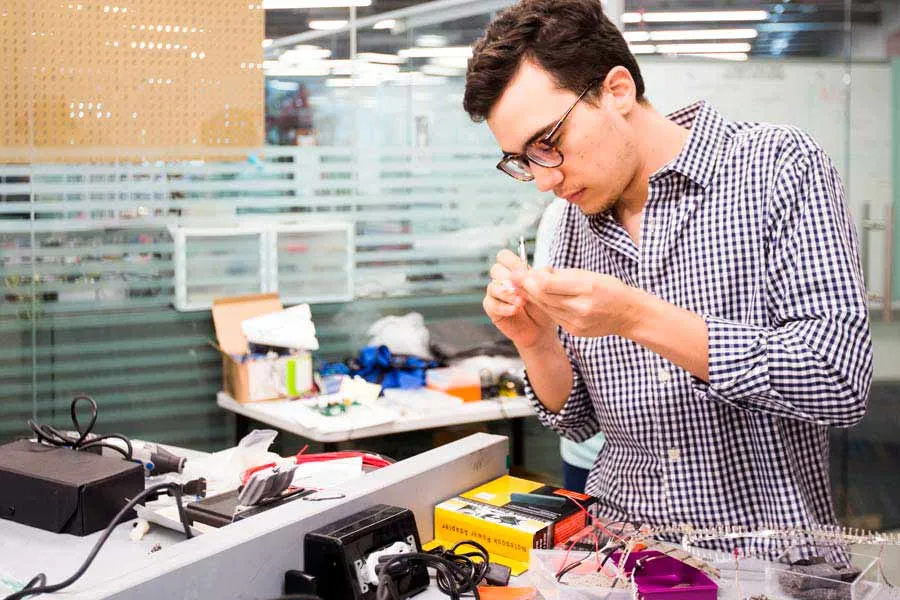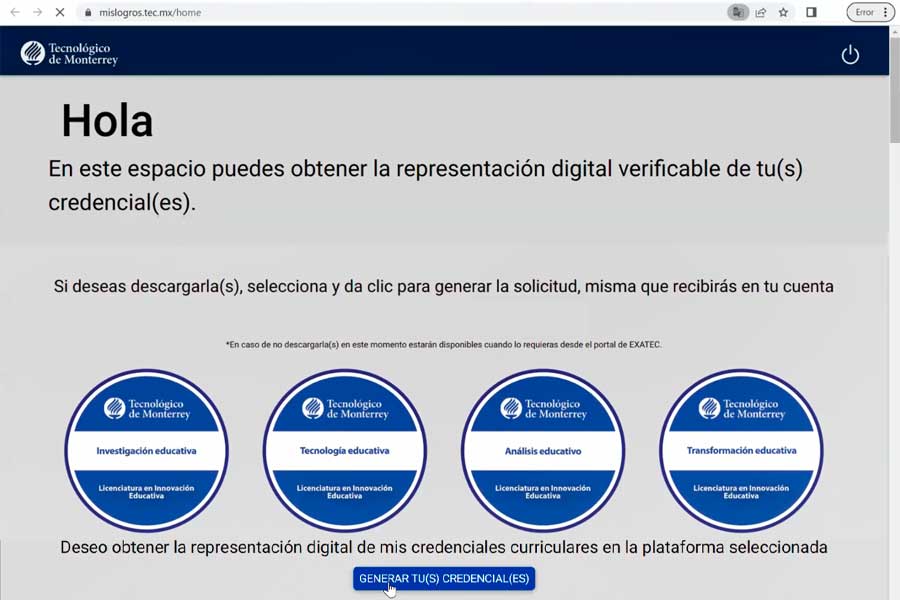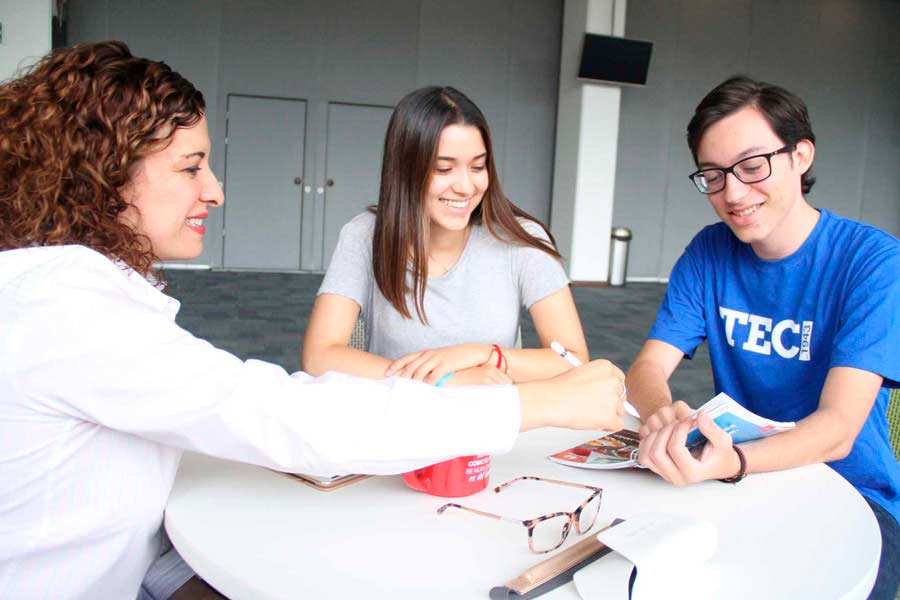Georgina is now a Tec graduate with a degree in Educational Innovation; she received her degree with blockchain technology and four badges that certify her skills, endorsed by Tec de Monterrey.
Educational Analysis and Educational Technology are two of the four competencies that she was certified for. Like more than 6,500 other Tec graduates, she received digital badges as part of the Tec’s new institutional credentialing strategy.
With this strategy, the Tec aims to show employers and the labor market its graduates’ real-life knowledge, skills, attitudes, and values.
“Credentialing the subject competencies of graduates is innovative and places the Tec among pioneering educational institutions in integrating this educational trend into its syllabus,” said Rafaela Diégoli, Academic Vice Rector of the Tec.
This makes the Tec a pioneer in Mexico and Latin America in including curricular credentials in undergraduate syllabuses, which can be published on social media and platforms such as LinkedIn.

Credentials to certify learning
The objective of this institutional credentialing strategy is to recognize new knowledge, skills, and competencies that facilitate entry into the labor market, said Claudia Zubieta, Director of the Assessment and Alternative Credentials Center.
“Certifying the competencies of graduates through the credentials and their badges allows us to demonstrate the achievements accomplished under a competency-based educational model,” said Zubieta.
Currently, the Tec offers two types of credentials: Curricular credentials for the subject competencies of undergraduate students; and alternative credentials for the Tec graduate community and Continuing Education students.
Moreover, as part of this strategy, the Tec establishes standards and procedures at all educational levels to grant alternative credentials, which are a new way of acquiring, deepening, or achieving new learning in higher education.
The institution aims for its students to experience both types of training in parallel: a university degree and specific skills development, in order to complement and reinforce what they have learned.
- Curricular credentials
These have been part of Tec students’ syllabuses since the 2019 Syllabus, in which competency-based learning began to be implemented based on challenges that are carried out in collaboration with training partners.
Training partners are institutions from the private sector, governments, and civil organizations that, together with professors, design challenges to help students develop skills for the labor market.
These credentials show the integral development of subject competencies that were included in the syllabuses established by all the Tec’s schools in its 40 programs.
“There are currently 203 subject credentials that students can display and share on their social media, showing that they have fulfilled what is necessary to acquire and develop the competency,” explained Zubieta.
For example, Georgina earned credentials in Educational Research, Educational Technology, Educational Analysis, and Educational Transformation.
- Alternative credentials
On the other hand, alternative credentials represent a simple, streamlined, and accessible way to acquire, deepen or achieve new knowledge that is taught as part of the Tec’s Continuing Education courses.
These enable Tec graduates and Continuing Education students to update and certify skills and competencies and help strengthen their professional profiles for employers in the labor market.
One example of their implementation is that Tec de Monterrey was part of the global definition of alternative credentials, being one of the 50 universities in the world invited by UNESCO for this purpose.
Beatriz Palacios, the Tec’s Director of Educational Innovation and Digital Learning, collaborated on the definition and highlighted that the credentials certify learning achievements, skills, and competencies acquired through training and professional development experiences.
Currently, The Tec has different options such as workshops, diploma courses, and certifications in which Alternative Credentials can be granted.

Tec a pioneer in launching curricular credentials
As their name suggests, curricular credentials for subject competencies are part of the student syllabus, so they do not incur an additional cost and are accredited throughout the student’s university education.
In June 2023, Tec graduates received curricular credentials and digital badges for the first time. They could also access the platform from where to share them on their social media.
Tec students graduating under the 2019 Syllabus and the first year of the Tec21 Model received curricular credentials that are now part of their digital portfolio, said Bertha Saldívar, Director of Educational Technologies.
“In 2018, we were pioneers in issuing undergraduate degree certificates registered in blockchain. Today, we complement this experience by providing digital badges for subject competencies,” said Saldívar.
“This is how we help our students to track their learning progress throughout their lives,” she added.
The Tec21 Model is based on competency-based learning, with flexibility, inspiring teachers, and a memorable university experience.
- What do competencies consist of?
Competencies, considered as academic achievements, are made up of several sub-competencies that students must acquire throughout their time at the Tec, said María José Pineda, Director of Assessment at the Academic Vice Rector’s Office.
“Competencies, which can be described as knowledge, skills, attitudes, and values to solve real situations, are divided into more specific parts that are sub-competencies,” said Pineda.
Saldívar added that “these will be assessed as part of the Training Units; the number of sub-competencies for each competency can vary, ranging from 3 to 5 at the most.”
In order to certify a competency, students must complete each and every one of these sub-competencies throughout their degree; if they fail to do so, they will not be entitled to this subject credential at the end of their studies.

- How is the acquisition of skills certified and who does so?
At the Tec, faculty members assess skills development through projects and guidelines, and the automated Institutional Achievement Management system issues certification once students have completed the required training.
Students have access to information on the progress and status of their competencies throughout their training.
- Which ones are available and how can they be accessed?
Depending on the program selected, students may have several curricular credentials automatically related to their syllabus.
Depending on their degree, students can achieve between 4 and 5 credentials on average.
“In 2018, we were pioneers in issuing undergraduate degree certificates registered in blockchain. Today, we complement this experience by providing digital badges for subject competencies,”- Bertha Saldívar.
- How can employers view badges?
In addition to students being able to display the acquisition and development of competencies and be aware of this, offering curricular credentials will help employers to confirm the skills of graduates.
Once they have completed their degrees, Tec graduates must register through a website where they will be able to access digital badges and share them on social media or platforms such as LinkedIn.
This will help facilitate their entry into the labor market since employers will be able to verify the certification of their credentials directly with the Tec online.
“It actually makes the syllabus accessible in a way that it can be better understood by employers and the non-academic world,” said the Director of Assessment.
Pineda added that “as well as showing the different courses you have taken, competencies mean you have the ability to do something and apply it, which differentiates you from other graduates who are also doing the same degree.”
On the platform, graduates will be able to add other digital badges to their digital portfolio if they take any of the Tec’s Continuing Education courses and earn alternative credentials.
ALSO READ:





